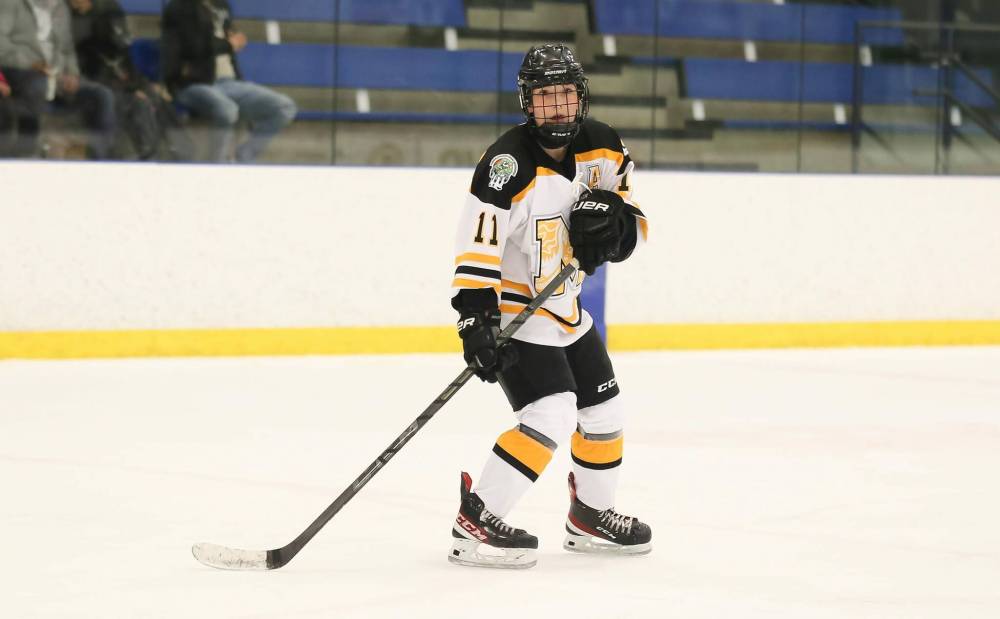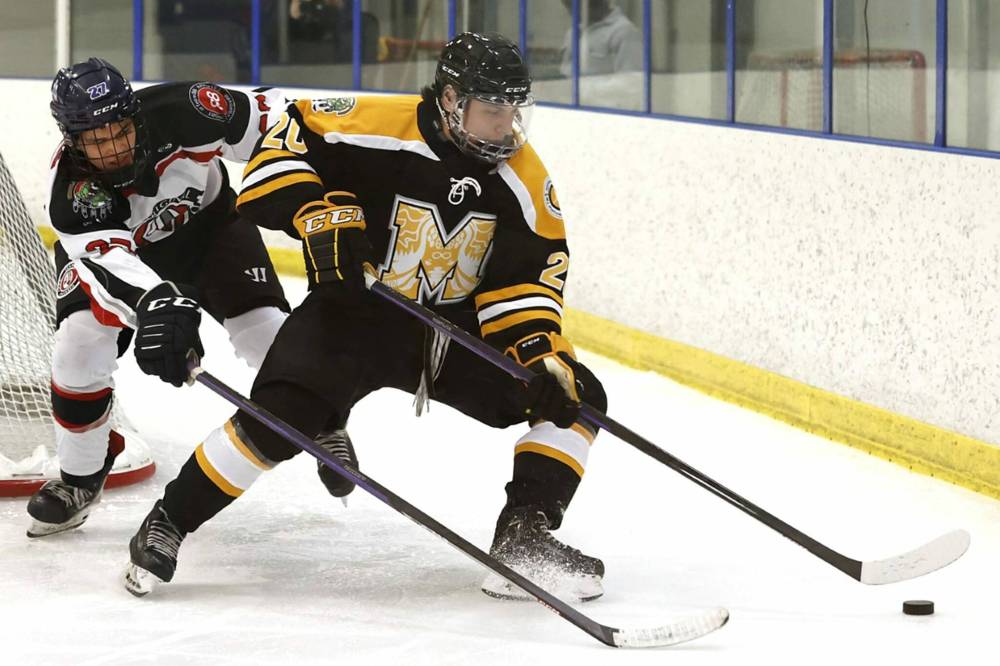Culture is as big as the tournament National Aboriginal Hockey Championships a showcase of Indigenous talent
Read this article for free:
or
Already have an account? Log in here »
To continue reading, please subscribe:
Monthly Digital Subscription
$0 for the first 4 weeks*
- Enjoy unlimited reading on winnipegfreepress.com
- Read the E-Edition, our digital replica newspaper
- Access News Break, our award-winning app
- Play interactive puzzles
*No charge for 4 weeks then price increases to the regular rate of $19.00 plus GST every four weeks. Offer available to new and qualified returning subscribers only. Cancel any time.
Monthly Digital Subscription
$4.75/week*
- Enjoy unlimited reading on winnipegfreepress.com
- Read the E-Edition, our digital replica newspaper
- Access News Break, our award-winning app
- Play interactive puzzles
*Billed as $19 plus GST every four weeks. Cancel any time.
To continue reading, please subscribe:
Add Free Press access to your Brandon Sun subscription for only an additional
$1 for the first 4 weeks*
*Your next subscription payment will increase by $1.00 and you will be charged $16.99 plus GST for four weeks. After four weeks, your payment will increase to $23.99 plus GST every four weeks.
Read unlimited articles for free today:
or
Already have an account? Log in here »
Hey there, time traveller!
This article was published 11/05/2023 (943 days ago), so information in it may no longer be current.
Sophia Anderson will tell you the National Aboriginal Hockey Championships (NAHC) provides a golden opportunity for Indigenous players to get recognized on the ice.
It’s where she shined a year ago for the Manitoba women’s squad before committing to the University of Manitoba women’s program. She’ll suit up for the Bisons this fall.
It’s also helped produce players such as Canadian national team members Jocelyne Larocque, Brigette Lacquette and Jamie Lee Rattray.
Equally important, it’s a chance for those who share similar backgrounds to unite for one week, with a national crown up for grabs.
Tammy Stewner photo Sophia Anderson of team Manitoba at the National Aboriginal Hockey Championships.
The 20th edition of the NAHC wraps up Saturday at Seven Oaks Sportsplex as more than 300 Indigenous athletes from nine different regions across Canada vie for the titles in female and male divisions.
The tournament, held in Winnipeg for the first time since 2009, features teen athletes who are members of teams in U18 AAA, prep schools and junior hockey. It’s become a big draw, as well, packing the 400-seat arena in north Winnipeg while more than 31,000 people have tuned in via live stream this week.
Anderson, who is Métis, said it’s about more than what takes place on the ice.
“The culture really is just as big as the tournament,” said the 18-year-old from Glenboro. “It’s super empowering to be around others who share the same background, the same culture as you. It’s just a really fun tournament to be in, super positive environment and really uplifting, I feel.
“The culture is just as important as the hockey and I think I can speak for the rest of my team, as well, when I say that.”
“The culture is just as important as the hockey and I think I can speak for the rest of my team, as well, when I say that.”–Sophia Anderson
The week started about as well as Anderson could’ve hoped for, but came to a jarring halt. The versatile forward registered two goals and two assists in a little under six periods of play before dislocating her shoulder in the waning moments of Manitoba’s second preliminary game against Alberta, ending Anderson’s tournament early.
The team has remained solid in the absence of their alternate captain, though.
Manitoba went 3-1 in the preliminary play, earning a first-round bye to the semifinals, which take place today at 4 p.m. against an undetermined team (at press time). The Manitoba male team also made the playoffs and was to play a quarter-final game against Nunavut late Thursday.
The women are clearly the team to beat in its bracket, seeking a second-straight national title and its fourth in the last five events. There were no tournaments in 2020 and 2021, owing to the pandemic.
“We have the same goal in mind. Lots of girls played on the team last year so we know what it feels like to win the championship, but also know what it takes and what we’re going to have to do to get ourselves there again,” Anderson said.
Sophia Anderson of Team Manitoba says the National Aboriginal Hockey Championships (NAHC) provides a golden opportunity for Indigenous players to get recognized on the ice.Behind the scenes, the tournament has taken great strides, thanks to people like Dale Bear, the Manitoba women’s head coach.
In 2013, Bear, an assistant coach at that time, noticed a lack of scouts in attendance at the NAHC. The following summer, his first as head coach, he started cold-calling universities and colleges across North America, inviting them to visit the NAHC to have a look at his players. It quickly caught fire.
“As soon as they came out, the word started getting out, so I guess it’s a small-knit community with the scouts of the universities,” Bear said. “It must’ve been 2015 when a lot of universities started reaching out to me and our girls.”
“As soon as they came out, the word started getting out, so I guess it’s a small-knit community with the scouts of the universities… It must’ve been 2015 when a lot of universities started reaching out to me and our girls.”–Dale Bear
Since then, several players have been plucked by post-secondary programs, including Anderson. This year, Bear said the University of Maine, University of Minnesota and several U Sports schools have reached out to him about his players.
The male team can’t be forgotten either, as the squad seeks its fourth national title, the last coming in 2019. The opportunity to join current and former NHL players who have skated in this tournament, such as Manitoba men’s head coach Michael Ferland, Ethan Bear (Vancouver Canucks) and Zach Whitecloud (Vegas Golden Knights), hasn’t been lost on Hayden Paupanekis.
“I look up to most of those guys so it’s pretty cool to play in the same tournament as them,” said the Cree 16-year-old, who plays centre.
“It’s pretty cool, everybody playing against each other. A bunch of Aboriginals, the best of the best, playing against each other, it’s pretty freaking cool.”
James Carey Lauder photo Team Manitoba Marlen Edwards is chased by Team Ontario at Seven Oaks Arena in the National Aboriginal Hockey Championships.
Kevin Monkman, the manager of the team, noted the original intent of the NAHC was to provide an opportunity for Indigenous athletes to play at a high level. Safe to say it’s doing just that.
“Having a tournament like this is a high level,” he said. “A lot of the teams, not just Manitoba, have kids who will go on to play junior-A, Western Hockey League, some will get scholarships — both male and female.
“It’s important. I’ve been involved for the last nine, 10 years now, so just seeing the development of some of the kids and seeing them going back to the communities, I know a lot of these kids are role models within their communities.”
jfreysam@freepress.mb.ca
Twitter: @jfreysam

Josh Frey-Sam reports on sports and business at the Free Press. Josh got his start at the paper in 2022, just weeks after graduating from the Creative Communications program at Red River College. He reports primarily on amateur teams and athletes in sports. Read more about Josh.
Every piece of reporting Josh produces is reviewed by an editing team before it is posted online or published in print — part of the Free Press‘s tradition, since 1872, of producing reliable independent journalism. Read more about Free Press’s history and mandate, and learn how our newsroom operates.
Our newsroom depends on a growing audience of readers to power our journalism. If you are not a paid reader, please consider becoming a subscriber.
Our newsroom depends on its audience of readers to power our journalism. Thank you for your support.








